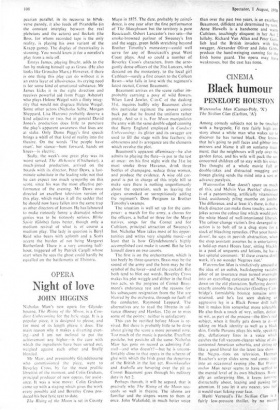OPERA
Night of love
JOHN HIGGINS
Nicholas Maw's new opera for Glynde- bourne, The Rising of the Moon, is a Con- duct Unbecoming for the lyric stage. It is a popular piece, it is designed to please, and for most of its length please it does. The main reason why it makes a diverting even- ing—and I am not inclined to put the achievement any higher—is the care with which the ingredients have been sorted out, weighed against each other and finally blended.
Mr Maw, and presumably Glyndebourne who commissioned the piece, went to Beverley Cross. by far the most prolific librettist of the moment, and Colin Graham, principal producer of new operas, for assist- ance. It was a wise move: Colin Graham came up with a staging which gives the work every possible aid and Beverley Cross pro- duced his best lyric text to date.
The Rising of the Moon is set in County Mayo in 1875. The date, probably by coincis dence, is one year after the first performance of The Shaughraun but the territory is pure Boucicault. Osbert Lancaster's two sets—the smoke-browned parlour of Sweeney's Inn and the soggy, green fields stretching beyond Brother Timothy's monastery—could well serve for any of Boucicault's great West Coast plays. And so could a number of Beverley Cross's characters, from the arro- gantly dense officers of the 31st Lancers, who descend on the monastery, to the local girl Cathleen—surely a first cousin to the Colleen Bawn—who falls in love with the regiment's latest recruit, Cornet Beaumont.
Beaumont arrives on the scene rather im- probably carrying a posy of wild flowers. When Lord Jowler, C-in-C of the dashing 31st, inquires huffily why Beaumont chose this particular regiment the answer comes back pat that he found the uniform rather pretty. And so it is. For Moon manipulates the army with the same double-edged cunning that Barry England employed in Conduct Unbecoming: its glitter and its swagger are used to fill the stage with fine feathers; its obtuseness and its arrogance are the elements which revolve the plot.
Beaumont's apparent effeminacy—he also admits to playing the flute—is put to the test at once: on his first night with the 31st he must smoke three Havanas, drink three bottles of champagne, seduce three women, and produce the evidence. A wise old cor- poral is put in charge of this triple bill to make sure there is nothing ungentlemanly about the operation, such as leaving the cigars unsmoked or surreptitiously adding the regiment's Dom Perignon to Brother Timothy's swamps.
The situation is well set up for the com- poser: a march for the army, a chorus for the officers, a ballad or three for the Mayo natives, songs for the Cornet and for Cathleen, principal attraction of Sweeney's Inn. Nicholas Maw takes most of his oppor- tunities and writes very singable music—at least that is how Glyndebourne's highly accomplished cast make it sound. But he lets himself down on two counts.
The first is on the orchestration, which is too beefy by three-quarters. Brass may be the sound of the army and the horn may be the symbol of the lover—and of the cuckold. But both tend to blot out words. Beverley Cross makes his plot wriggle and slither in the final two acts, so the progress of Cornet Beau- mont's endurance test and the reasons for his subsequent resignation from the 31st are blurred by the orchestra, through no fault of the conductor, Raymond Leopard. The alternatives are to read the libretto in ad- vance (Boosey and Hawkes, 12s) or to miss some of the points: neither is satisfactory.
This can be rectified before Moon is re- vived. But there is probably little to be done about giving the score a more personal note. Too much of the music is pastiche. Excellent pastiche, but pastiche all the same. Nicholas Maw has gone on record as admiring Fal- siall—and who doesn't?—but he is uncom- fortably close to that opera in the scherzo of glee with which the Irish greet the departure of the British in the last act. Ro.senkavaiier and Arabella are hovering over the pit as Cornet Beaumont goes through his military duty in Act 2.
Perhaps though, it will be argued, that is precisely why The Rising of the Moon suc-
ceeds so well in theatre. The idioms are familiar and the singers warm to them at once. John Wakefield, in much better voice
than over the past two years, is an excellent Beaumont, diffident and determined by turn. Anne Howells is a handsome and warm Cathleen, touchingly eloquent in her Act lullaby. Richard Van Allan and Peter Gott. lieb lead the British invaders with fine swagger, Alexander Oliver and John Gbh, produce the hand-wringing cunning for the Irish home guard. The opera may ha%e weaknesses, but the cast has none.






























 Previous page
Previous page